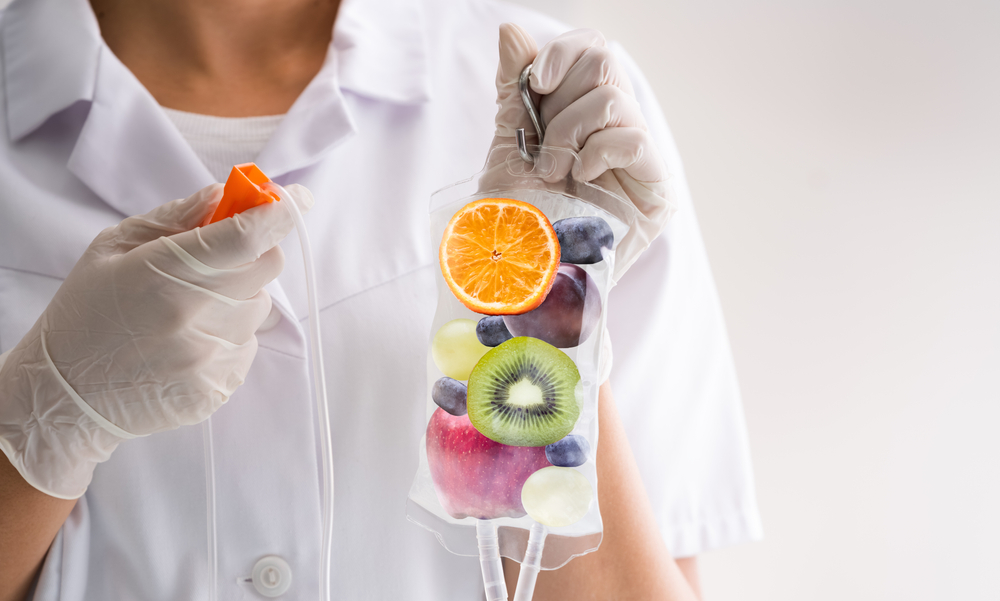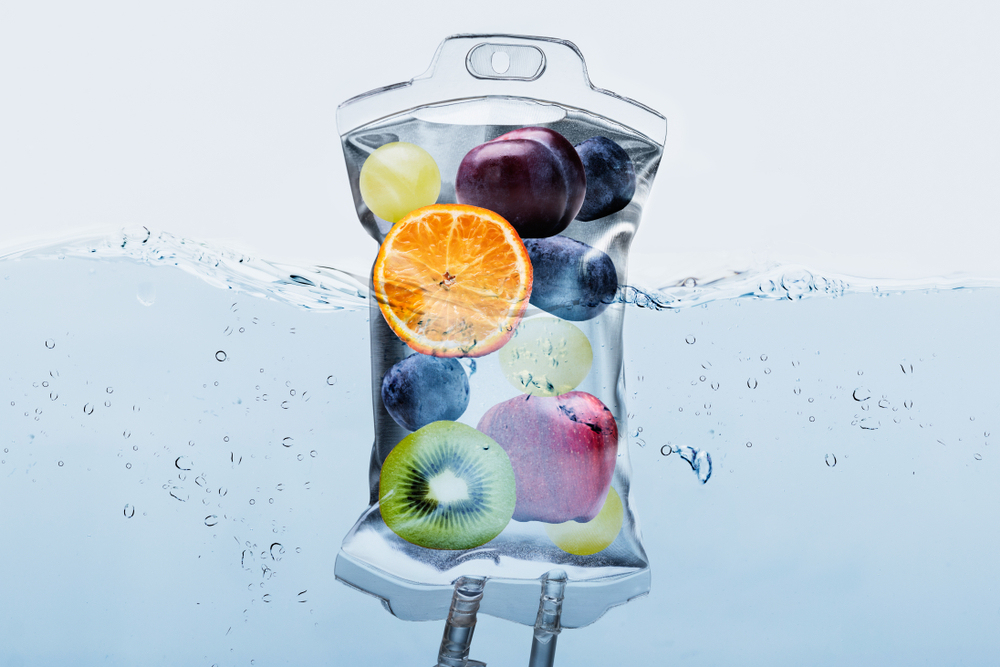Living with Crohn's disease presents unique challenges in maintaining proper nutrition. When traditional eating becomes difficult or impossible, IV nutrition emerges as a vital solution for patients battling this chronic inflammatory condition.
IV nutrition, also known as total parenteral nutrition (TPN), delivers essential nutrients directly into your bloodstream. This method bypasses the digestive system entirely - a critical advantage for Crohn's disease sufferers experiencing:
- Severe intestinal inflammation
- Digestive tract blockages
- Persistent diarrhea
- Post-surgical recovery periods
For many patients, IV nutrition serves as a crucial lifeline when conventional eating fails to provide adequate nourishment. This specialized feeding method ensures your body receives vital nutrients even when your digestive system needs time to heal.
Think of IV nutrition as a temporary bridge, supporting your body through severe flare-ups or surgical recovery. It provides:
- Direct delivery of proteins, fats, and carbohydrates
- Essential vitamins and minerals
- Precise control of nutrient intake
- Rest for inflamed intestinal tissue
Your journey with Crohn's disease might require various treatment approaches, and IV nutrition stands ready as a powerful tool in your medical team's arsenal. This specialized nutritional support can mean the difference between prolonged malnutrition and maintaining your body's strength during challenging periods of your condition.
Moreover, it's worth noting that IV hydration therapy can also play a significant role in enhancing overall wellness by providing essential fluids and nutrients directly into the bloodstream.
Understanding Crohn's Disease and its Impact on Digestive Health
Crohn's disease strikes at the core of your digestive system, causing chronic inflammation that can affect any part of your gastrointestinal tract. This inflammatory bowel disease (IBD) creates patches of inflamed tissue, often starting in the small intestine and colon.
Key Characteristics of Crohn's Disease:
- Inflammation can penetrate deep into the intestinal walls
- Affects different areas in "skip lesions" - patches of healthy tissue between diseased sections
- Can lead to strictures (narrowing) and fistulas (abnormal connections between organs)
- May cause permanent damage to the digestive tract over time
The impact on your digestive health manifests through various symptoms:
Primary Symptoms:
- Severe abdominal pain, especially after eating
- Persistent diarrhea
- Unexplained weight loss
- Fatigue and reduced energy levels
- Blood in stool
- Reduced appetite
Your digestive system becomes compromised as inflammation disrupts normal nutrient absorption. The intestinal walls can thicken, creating obstacles for food passage and nutrient uptake. This inflammation triggers a cascade of digestive issues:
Digestive Complications:
- Malabsorption of essential nutrients
- Frequent bowel movements
- Cramping and bloating
- Nausea and vomiting
- Intestinal blockages
- Anal fissures or fistulas
The severity of symptoms varies from person to person. Some experience mild discomfort, while others face debilitating pain that interferes with daily activities. The unpredictable nature of flare-ups can make eating a challenging experience, as certain foods may trigger or worsen symptoms.
Research shows that stress, diet, and environmental factors can influence symptom intensity. The disease often follows a relapsing-remitting pattern, with periods of active disease alternating with periods of remission.
In such challenging times, maintaining overall wellness becomes crucial. Implementing some essential wellness tips could help manage the stress associated with Crohn's disease. For instance, utilizing mobile IV therapy can be an effective way to ensure proper hydration and nutrient absorption when oral intake is difficult.
Moreover, considering a comprehensive [detoxification regimen](https://www.livitywellnessfl.com/lity-detox) could aid in purifying your system and eliminating toxins that may exacerbate your condition. Additionally, specialized treatments like Immune Blast IV Therapy can help fortify your immune system, enhancing recovery and maintaining optimal health amidst the challenges posed by Crohn's disease.

The Role of IV Nutrition in Managing Crohn's Disease Symptoms
IV nutrition is a crucial lifeline for Crohn's disease patients. It delivers essential nutrients directly into the bloodstream, bypassing the compromised digestive tract. This allows patients to receive critical nutrition when their gastrointestinal tract is unable to process or absorb nutrients effectively.
Key Benefits of IV Nutrition Support:
- Direct Nutrient Delivery: Essential vitamins, minerals, proteins, and calories enter the bloodstream immediately, avoiding inflammation-damaged areas of the digestive tract. This is particularly beneficial when we consider IV Therapy vs. Oral Supplements, where the absorption rates and overall effectiveness can vary significantly.
- Bowel Rest: The gastrointestinal tract receives time to heal without the stress of processing food
- Rapid Nutritional Improvement: Patients experience faster correction of nutritional deficiencies compared to oral intake
- Pre-surgical Support: IV nutrition helps strengthen patients before surgical procedures
- Post-operative Recovery: Supports healing and maintains nutritional status when eating isn't possible
The therapeutic approach of IV nutrition addresses several gastrointestinal complications:
- Intestinal Blockages: Provides nutrition when food cannot pass through narrowed or blocked sections of the GI tract
- Severe Inflammation: Bypasses inflamed areas that cause pain and poor absorption
- Fistula Management: Supports healing by reducing bowel activity
- Malabsorption Issues: Ensures nutrient delivery despite compromised absorption capacity
IV nutrition acts as a bridge therapy during severe disease flares, allowing medical teams to:
- Stabilize nutritional status
- Control inflammation
- Prepare patients for necessary treatments
- Support recovery phases
- Manage complications
This nutritional intervention proves particularly valuable for patients experiencing:
- Persistent diarrhea
- Significant weight loss
- Poor nutrient absorption
- Bowel obstructions
- Post-surgical recovery periods
The ability to deliver precise amounts of nutrients through IV nutrition helps maintain optimal nutritional status while other treatments address the underlying Crohn's disease inflammation. This targeted approach supports both immediate nutritional needs and long-term disease management strategies.
For those considering Replenish IV Therapy, it offers an excellent solution to boost vitality, enhance energy, hydration, and overall health with tailored treatments. Furthermore, for individuals facing hangover symptoms post-treatment or surgery, our Morning After IV Therapy can provide fast relief by alleviating hangover symptoms, rehydrating the body, and restoring energy levels.
Mechanism and Advantages of IV Nutrition Delivery for Crohn's Patients
IV nutrition delivery operates through a sophisticated system designed to bypass compromised digestive areas. A central venous catheter delivers nutrients directly into your bloodstream, creating an efficient pathway when your small intestine or large intestine can't process food normally.
Key Components of IV Nutrition Delivery:
- Specialized Formula Composition: Precise combinations of proteins, carbohydrates, and fats; customized electrolyte balance; tailored vitamin and mineral supplements
- Delivery Methods: Central line placement in large veins; programmable pump systems; sterile preparation techniques
Bypassing Challenges with IV Delivery
Small intestine blockages present unique challenges for Crohn's patients. The IV delivery system circumvents these obstacles by providing nutrition without requiring passage through narrowed or inflamed sections. This bypass mechanism proves particularly valuable during acute flares when intestinal swelling restricts normal nutrient flow.
Adapting to Large Intestine Involvement
Large intestine involvement affects nutrient absorption differently. IV nutrition adapts to these specific needs by maintaining fluid balance, delivering minerals typically absorbed in the colon, and supporting electrolyte levels.
Precision Adjustments for Optimal Nutrition
The precision of IV nutrition delivery allows for real-time adjustments based on your body's needs. Blood tests guide formula modifications, ensuring optimal nutrient levels while avoiding overload. This dynamic approach proves especially beneficial when dealing with:
- Strictures in the small intestine
- Extensive large intestine inflammation
- Post-surgical recovery periods
- Active disease flares
Your medical team can monitor absorption rates and adjust delivery speeds accordingly. This controlled administration helps prevent complications while maximizing nutritional benefits. The system's flexibility accommodates various disease presentations, from localized inflammation to extensive bowel involvement.
Reducing Strain on the Digestive System
The direct-to-bloodstream delivery mechanism also reduces strain on your digestive system. This rest period often promotes healing in inflamed areas while maintaining essential nutrition levels.
Enhancing Health with Tailored IV Therapy
Additionally, IV therapy can also be tailored to enhance overall health and well-being, providing benefits beyond mere nutritional support. For instance, therapies like Ultimate Beauty IV Therapy at Livity Wellness not only deliver essential nutrients but also boost collagen production and hydrate the skin, promoting a glowing complexion.
Convenient Solutions with Mobile IV Therapy
In certain situations, such as during group trips where convenience is key, mobile IV therapy could be an ideal solution. This service offers personalized treatments that boost energy, hydration, and recovery right at your location, making it a perfect fit for Crohn's patients who need flexible and immediate nutritional support.
Moreover, recent studies have shown that the use of bio-telemetry technology in conjunction with IV nutrition can further enhance patient care by enabling real-time monitoring of physiological parameters and improving the overall effectiveness of the
Long-Term Considerations and Risks of Using IV Nutrition Support
Long-term IV nutrition support presents significant challenges for Crohn's disease patients. Understanding these risks helps patients and healthcare providers make informed decisions about treatment plans.
Key Medical Risks:
- Central line infections can lead to serious complications
- Blood clots may form around IV insertion sites
- Liver dysfunction from prolonged TPN exposure
- Bone density loss due to mineral imbalances
- Refeeding syndrome in malnourished patients
Nutrient-Related Complications:
- Electrolyte imbalances requiring constant monitoring
- Vitamin deficiencies despite supplementation
- Mineral absorption issues affecting bone health
- Blood sugar fluctuations needing careful management
Chronic diarrhea management becomes particularly challenging during long-term IV nutrition. Patients often experience:
- Dehydration despite IV fluid support
- Electrolyte losses requiring precise replacement
- Increased risk of metabolic acidosis
- Difficulty maintaining proper nutrient levels
Monitoring Requirements:
- Weekly blood tests to check organ function
- Regular catheter site inspections
- Frequent assessment of fluid balance
- Ongoing evaluation of nutritional status
The presence of long-term diarrhea can significantly impact IV nutrition effectiveness. Healthcare providers must adjust formula compositions and delivery rates to compensate for:
- Increased fluid losses
- Enhanced electrolyte depletion
- Changes in absorption patterns
- Altered metabolic demands
Prevention Strategies:
- Strict sterile technique for line care
- Regular line dressing changes
- Proper hand hygiene protocols
- Careful monitoring of insertion sites
- Prompt recognition of complications
Patients receiving extended IV nutrition require specialized care teams to manage these complexities. Your healthcare team will create individualized protocols based on:
- Disease severity
- Nutritional status
- Presence of complications
- Response to treatment
For those facing the difficulties associated with long-term IV nutrition, comprehensive care services such as those offered by Livity Wellness can provide essential support. Their specialized healthcare team is equipped to handle the unique challenges posed by conditions like Crohn's disease, ensuring that patients receive the tailored treatment they need.

Managing Long-Term IV Nutrition Support for Individuals with Short Bowel Syndrome
Short bowel syndrome presents unique challenges for Crohn's disease patients requiring sustained IV nutrition support. Specialized care programs, such as those offered by Livity Wellness, provide comprehensive management strategies tailored to each patient's specific needs.
Key Components of Specialized Care Programs:
1. Nutritional Monitoring Teams
- Regular assessment of nutrient levels
- Customized IV formula adjustments, including options like Alpha Lipoic Acid IV Therapy which can enhance antioxidant protection and support overall wellness
- Tracking of fluid and electrolyte balance
2. Medical Device Management
- Central line care protocols
- Infection prevention strategies
- Regular catheter maintenance
3. Intestinal Rehabilitation Programs
- Adaptive feeding techniques
- Oral intake optimization
- Intestinal adaptation support
Patients with short bowel syndrome benefit from coordinated care involving multiple specialists:
- Gastroenterologists monitor disease progression
- Nutrition specialists adjust IV formulations
- Wound care nurses maintain central line sites
- Pharmacists manage medication interactions
- Social workers provide lifestyle adaptation support
Home care protocols play a vital role in successful long-term management. These protocols include:
- Sterile technique training
- Emergency response procedures
- Supply management systems
- Equipment maintenance schedules
Quality of Life Considerations:
- Flexible IV nutrition schedules that could include therapies like the Ultimate Cure IV Therapy for optimized health and recovery
- Portable pump systems
- Travel accommodation plans
- Work/school integration strategies
Advanced monitoring technologies help track patient progress through:
- Remote vital sign monitoring
- Digital symptom tracking
- Real-time healthcare provider communication
- Automated supply ordering systems
The success of long-term IV nutrition depends on patient engagement and adherence to prescribed protocols. Regular assessment of intestinal function helps determine if patients can transition to partial enteral nutrition or reduced IV support over time.
Moreover, the emotional and psychological aspects of living with short bowel syndrome should not be overlooked. Access to resources that aid in mental well-being, such as counseling services provided by social workers, can greatly enhance the quality of life for these patients.
It's important to note that the management of short bowel syndrome often involves a multidisciplinary approach, combining various medical specialties to ensure comprehensive care. This is crucial as the condition can lead to significant nutritional deficiencies and other health complications if not managed properly. For an in-depth understanding of this complex condition, refer to this detailed article on Short Bowel Syndrome which offers valuable insights into its management and treatment options.
Additionally, recent studies have highlighted the effectiveness of certain interventions in improving the quality of life for patients with short bowel syndrome, including advanced nutritional therapies and psychological support mechanisms. For more information on these findings, please see this research article on [Long-Term Management Strategies for Short Bowel Syndrome](
Psychological and Social Aspects of Living with IV Nutrition as a Crohn's Patient
Living with IV nutrition as a Crohn's patient brings unique psychological and social challenges that extend beyond physical symptoms. The daily management of IV nutrition can create significant emotional strain, affecting relationships, work life, and social activities.
Common Emotional Challenges:
- Feelings of isolation during feeding sessions
- Anxiety about medical equipment and procedures
- Depression related to dietary restrictions
- Self-image concerns due to visible medical devices
- Stress from managing complex treatment schedules
The impact on social life can be particularly challenging. You might find yourself navigating social situations differently, especially those centered around food and dining. Many patients report feeling disconnected from regular social activities, as IV nutrition sessions often require dedicated time at home.
Practical Strategies for Social Integration:
- Schedule IV nutrition around social events when possible
- Connect with support groups specific to Crohn's and IV nutrition
- Educate friends and family about your needs
- Create alternative social activities not centered around food
- Maintain open communication with employers about treatment requirements
Managing gut pain while on IV nutrition requires a multi-faceted approach. Your healthcare team might recommend:
Pain Management Techniques:
- Heat therapy for abdominal discomfort
- Gentle movement exercises
- Stress reduction techniques
- Prescribed pain management medications
- Position adjustments during IV nutrition sessions
In addition to these strategies, Energy Boost IV Therapy could be considered to help revitalize energy levels and improve overall vitality, which can be particularly beneficial during challenging times. Also, exploring options like NAD Supercharge IV Therapy may enhance cellular repair and increase energy levels further supporting overall health.
Professional psychological support plays a crucial role in adapting to life with IV nutrition. Mental health professionals specializing in chronic illness can help you develop coping strategies and maintain emotional well-being. Support groups provide opportunities to connect with others who understand your experiences firsthand.
Working with occupational therapists can help you adapt your home and work environment to accommodate IV nutrition equipment while maintaining independence. These specialists can suggest modifications to make daily activities more manageable and help you maintain a sense of normalcy.
Moreover, incorporating specialized treatments like the PlaqueX and Alpha Lipoic Acid IV Therapy could provide additional health benefits such as supporting cardiovascular health and liver function while offering antioxidant protection.

Conclusion
IV nutrition is an important treatment option for people with severe Crohn's disease. It can help patients who have difficulty absorbing nutrients through their digestive system by providing essential nutrients directly into their bloodstream.
The success of IV nutrition therapy depends on proper medical supervision and timing. Early intervention often leads to better outcomes, especially when:
- The digestive system needs rest and healing
- Surgical procedures require nutritional optimization
- Traditional feeding methods prove insufficient
Medical guidance is essential for anyone considering IV nutrition treatment. The complexities of nutrient delivery and potential risks, including refeeding syndrome, require careful monitoring and adjustment by healthcare professionals.
"Professional oversight isn't just recommended—it's crucial for your safety and treatment success."
If you have Crohn's disease and are thinking about IV nutrition as a treatment option, keep these important points in mind:
- Consult with gastroenterology specialists
- Discuss your specific symptoms and needs
- Consider both short-term and long-term implications
- Work with a dedicated healthcare team for monitoring
Managing Crohn's disease with IV nutrition requires patience, commitment, and professional support. With the right medical guidance, this treatment approach can bring hope and healing to those facing severe forms of Crohn's disease.
.png)









